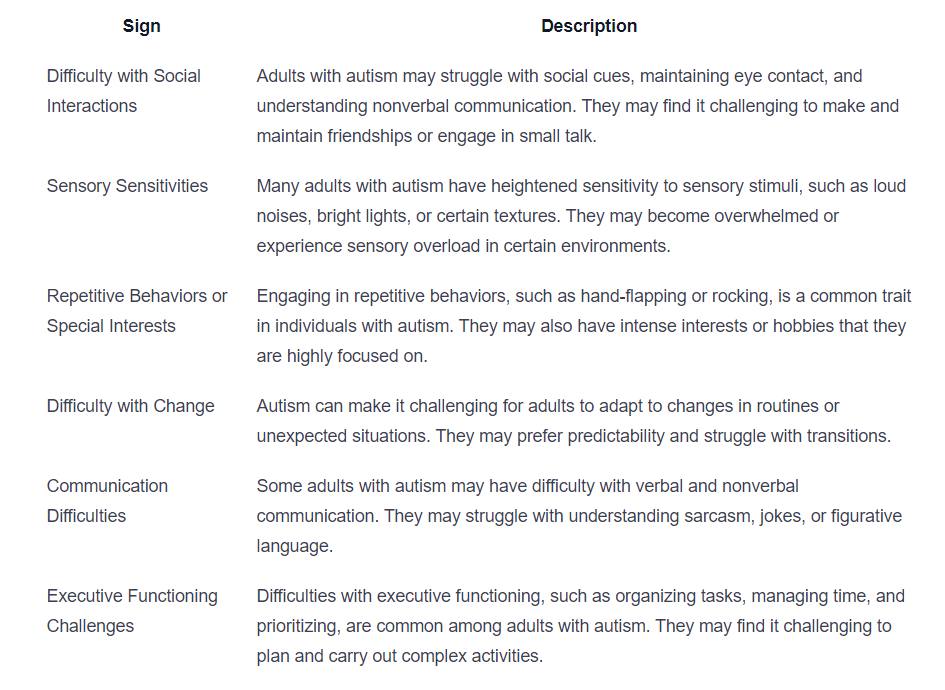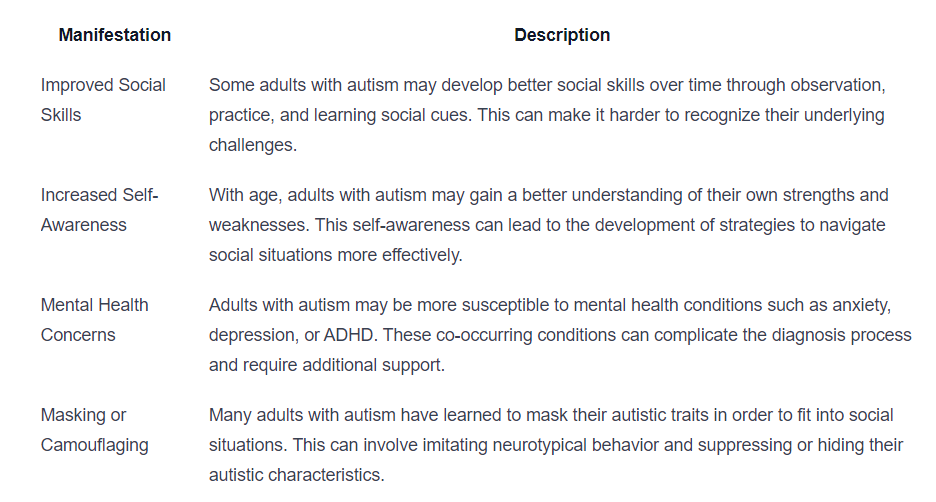Should I pursue an Autism Diagnosis as an Adult?
Deciding on an autism diagnosis as an adult? Uncover the benefits, challenges, and steps to empower your journey of self-discovery.

Understanding Autism Diagnosis as an Adult
For adults who suspect they may be on the autism spectrum, understanding the process and implications of an autism diagnosis is essential. This section explores what an autism diagnosis means for adults and factors to consider before pursuing a diagnosis.
What Does an Autism Diagnosis Mean?
An autism diagnosis as an adult means that you meet the diagnostic criteria for Autism Spectrum Disorder (ASD). It indicates that you have experienced persistent challenges in social communication and interaction, as well as restricted and repetitive patterns of behavior, interests, or activities.
Receiving an autism diagnosis can provide a deeper understanding of oneself and offer insight into why certain difficulties or differences may have been present throughout life. It can also help in accessing appropriate support and resources to address specific needs.
Factors to Consider Before Pursuing Diagnosis
Before pursuing an autism diagnosis as an adult, it's important to consider various factors that may impact the decision-making process. These factors can include personal, emotional, and practical considerations. Some of the key factors to think about are:
Factors to Consider
Self-Reflection: Take time to reflect on your experiences, challenges, and strengths. Consider how an autism diagnosis may provide clarity or impact your self-identity.
Support System: Evaluate the availability of support from family, friends, or professionals who can assist you through the diagnosis process and beyond.
Impact on Daily Life: Assess how an autism diagnosis may impact your daily life, including work, relationships, and overall well-being. Consider whether accommodations or adjustments may be necessary.
Access to Services: Research the availability of services, therapies, and resources that can help address specific challenges associated with autism. Consider whether a diagnosis would provide better access to these supports.
Emotional Preparedness: Understand the emotional impact that pursuing a diagnosis may have on you. Be prepared for a range of emotions, including relief, validation, or even uncertainty.
Financial Considerations: Evaluate the financial implications associated with pursuing a diagnosis, including the cost of assessments and potential expenses related to ongoing support or therapy.
Personal Goals: Consider how an autism diagnosis aligns with your personal goals and aspirations. Reflect on whether it would enhance your understanding of yourself and contribute to your overall well-being.
By carefully considering these factors, individuals can make an informed decision about whether pursuing an autism diagnosis as an adult is the right path for them. It is important to remember that the decision is personal and unique to each individual, and there is no right or wrong choice.
Signs and Symptoms
Recognizing the signs and symptoms of autism in adults is an important step in considering whether to pursue an autism diagnosis. While autism is typically diagnosed in childhood, many individuals may not receive a diagnosis until later in life. Understanding the common signs of autism in adults and how it can manifest differently is crucial for self-reflection and decision-making.
Common Signs of Autism in Adults
Autism presents differently in each individual, but there are several common signs that may indicate the presence of autism in adults. These signs include:

It's important to note that these signs alone may not indicate autism. A comprehensive assessment by a qualified professional is necessary for an accurate diagnosis.
How Autism Can Manifest Differently in Adults
Autism can manifest differently in adults compared to children. While some individuals may continue to exhibit similar traits from childhood, others may develop coping strategies that mask certain symptoms. Here are a few ways autism can manifest differently in adults:

Recognizing the signs and understanding how autism can manifest differently in adults is crucial in making an informed decision about pursuing an autism diagnosis. If you resonate with the common signs and experience challenges related to autism, it may be beneficial to seek a professional evaluation to gain a better understanding of yourself and access appropriate support and resources.
Benefits of Pursuing an Autism Diagnosis
Deciding whether to pursue an autism diagnosis as an adult can be a personal and complex decision. It is important to weigh the potential benefits and challenges. In this section, we will explore some of the benefits of pursuing an autism diagnosis as an adult.
Understanding Yourself Better
One of the significant benefits of pursuing an autism diagnosis as an adult is gaining a better understanding of yourself. An autism diagnosis can provide insights into your unique strengths, challenges, and the way you perceive and interact with the world. It can help you make sense of your experiences, behaviors, and preferences.
Understanding yourself better through an autism diagnosis can lead to increased self-awareness and self-acceptance. It can empower you to embrace your neurodiversity and appreciate your individuality, enhancing your overall well-being and quality of life.
Access to Support and Resources
Another advantage of pursuing an autism diagnosis as an adult is gaining access to support and resources. A diagnosis can open doors to a range of services, therapies, and accommodations that can assist you in navigating various aspects of life.
Once diagnosed, you may be eligible for specialized support programs, counseling, and social skills training tailored to meet your specific needs. Access to these resources can help you develop coping strategies, enhance your communication skills, and improve your overall functioning in different areas of life, such as education, employment, and relationships.
Validation and Acceptance
Obtaining an autism diagnosis as an adult can provide a sense of validation and acceptance. Many individuals who pursue a diagnosis have spent years feeling different or struggling to fit in without understanding why. A diagnosis can validate their experiences, confirming that their challenges and strengths are real and valid.
Moreover, an autism diagnosis can help foster self-acceptance and acceptance from others. It can encourage understanding and empathy in personal and professional relationships, leading to improved communication and support networks.
Benefits of Pursuing an Autism Diagnosis
Understanding Yourself Better
Access to Support and Resources
Validation and Acceptance
While pursuing an autism diagnosis as an adult presents its own set of challenges, it is essential to consider the potential benefits. Understanding yourself better, accessing support and resources, and gaining validation and acceptance are just a few of the positive outcomes that can result from pursuing an autism diagnosis. Ultimately, the decision rests on your personal circumstances, preferences, and goals.
Challenges of Pursuing an Autism Diagnosis
While pursuing an autism diagnosis as an adult can be a valuable and empowering journey, it is important to consider the challenges that may arise along the way. These challenges can include stigma and misconceptions, emotional impact, and practical considerations.
Stigma and Misconceptions
One of the primary challenges faced when pursuing an autism diagnosis as an adult is the stigma and misconceptions surrounding autism. There is still a lack of understanding and acceptance in society, which can lead to judgment and discrimination. It is essential to be prepared for potential negative reactions from others and to find ways to educate and advocate for yourself.
Emotional Impact
The emotional impact of pursuing an autism diagnosis can be significant. It is common to experience a range of emotions, including anxiety, uncertainty, and fear of the unknown. The process of self-discovery and understanding can be overwhelming at times. It is important to have a support system in place to help navigate these emotions and provide reassurance throughout the journey.
Practical Considerations
Practical considerations should also be taken into account when deciding to pursue an autism diagnosis as an adult. This includes factors such as financial implications, access to healthcare professionals, and the availability of diagnostic services in your area. It is crucial to research and understand the resources and support systems available to you to ensure a smooth diagnostic process.
To better understand the challenges associated with pursuing an autism diagnosis as an adult, it is important to gather information from reliable sources, seek support from others who have gone through a similar experience, and be prepared for potential obstacles along the way. By being aware of these challenges, you can make informed decisions and take proactive steps to overcome them, ultimately empowering yourself in the journey towards self-discovery and acceptance.
Steps to Take for Pursuing an Autism Diagnosis
If you are considering pursuing an autism diagnosis as an adult, there are several important steps you can take to guide you through the process. These steps include finding a qualified professional, understanding the diagnostic process and assessments involved, and knowing what to do after receiving a diagnosis.
Finding a Qualified Professional
When seeking an autism diagnosis as an adult, it is crucial to find a qualified professional who specializes in diagnosing autism spectrum disorders. Here are some steps to help you find the right professional for your needs:
- Research: Start by researching professionals in your area who have experience and expertise in adult autism diagnosis. Look for psychologists, psychiatrists, or neurologists who specialize in autism assessment.
- Referrals: Seek referrals from your primary care physician, mental health professionals, or support groups for individuals with autism. They may be able to recommend professionals who are knowledgeable in diagnosing autism in adults.
- Interview: Once you have identified potential professionals, consider scheduling an initial consultation or interview to discuss their experience, diagnostic approach, and any specific concerns or questions you may have.
- Credentials and Experience: Ensure that the professional you choose has the necessary credentials, such as being licensed and board-certified. Additionally, consider their experience in diagnosing autism in adults.
Diagnostic Process and Assessments
The diagnostic process for autism in adults typically involves a comprehensive assessment conducted by a qualified professional. Here are the key steps and assessments commonly used:
- Clinical Interview: Your evaluator will conduct a thorough clinical interview to gather information about your developmental history, social interactions, communication patterns, and behavior.
- Standardized Assessments: The evaluator may administer standardized assessments, such as the Autism Diagnostic Observation Schedule (ADOS) and the Autism Diagnostic Interview-Revised (ADI-R). These assessments help to evaluate your social communication skills, repetitive behaviors, and overall functioning.
- Medical Evaluation: A medical evaluation may be conducted to rule out any underlying medical conditions that could contribute to your symptoms.
- Observation and Feedback: The evaluator may observe your behavior in various settings to gather additional information. They may also seek input from family members, partners, or close friends to gain a comprehensive understanding of your experiences.
After Receiving a Diagnosis
Receiving an autism diagnosis as an adult can be a significant moment in your life. Here are some important steps to consider after receiving a diagnosis:
- Education and Understanding: Take the time to educate yourself about autism, its characteristics, and how it may impact your life. This knowledge will help you better understand yourself and your needs.
- Seek Support: Reach out to support groups, autism organizations, or online communities for individuals with autism. Connecting with others who share similar experiences can provide valuable support, guidance, and a sense of belonging.
- Develop a Plan: Work with your healthcare provider or a therapist to develop a personalized plan that addresses your specific needs and goals. This may involve therapy, accommodations, and strategies to help you navigate daily challenges.
- Advocate for Yourself: Advocate for your needs and rights in various settings, such as the workplace, educational institutions, and social environments. Understanding your diagnosis empowers you to communicate your needs effectively.
By following these steps, you can navigate the process of pursuing an autism diagnosis as an adult with greater confidence and clarity. Remember, the decision to pursue a diagnosis is a personal one, and seeking professional guidance can provide valuable insights into your unique strengths, challenges, and opportunities for growth.
Making an Informed Decision
When considering whether to pursue an autism diagnosis as an adult, it's essential to make an informed decision that is right for you. Here are three key steps to help you in this process: self-reflection and research, seeking support and guidance, and empowering yourself through knowledge.
Self-Reflection and Research
Before pursuing an autism diagnosis, take the time for self-reflection and research. Reflect on your own experiences, strengths, challenges, and patterns of behavior. Consider how these aspects align with the common signs and symptoms of autism in adults.
To assist in your self-reflection, you may find it helpful to keep a journal or make notes of specific situations or behaviors that you believe are related to autism. This can provide valuable insights when discussing your concerns with a healthcare professional.
Additionally, conduct research to gain a better understanding of autism, its characteristics, and how it can manifest in adults. This knowledge will empower you to have more meaningful discussions with healthcare professionals and make informed decisions about pursuing a diagnosis.
Seeking Support and Guidance
Seeking support and guidance is an important part of the decision-making process. Reach out to trusted friends, family members, or support groups who can provide a listening ear and offer different perspectives. Sharing your thoughts and concerns with others who have gone through similar experiences can be comforting and enlightening.
Consider connecting with autism advocacy organizations or online communities that provide resources and support for adults seeking a diagnosis. These communities can offer valuable insights, personal stories, and practical guidance to help you navigate the journey.
It is also recommended to consult with healthcare professionals who specialize in autism. They can provide professional guidance, assess your concerns, and help you understand the diagnostic process. They may refer you to specialists who can conduct the necessary assessments and evaluations.
Empowering Yourself Through Knowledge
Empower yourself by actively seeking knowledge about autism and the diagnostic process. Educate yourself about the benefits, challenges, and potential outcomes of pursuing an autism diagnosis as an adult. Understanding the diagnostic criteria and assessment methods will help you make informed decisions and actively participate in discussions with healthcare professionals.
By equipping yourself with knowledge, you can advocate for your needs and ensure that the diagnostic process is thorough and comprehensive. Remember to ask questions and seek clarification if there are any aspects you are unsure about. Knowledge empowers you to be an active participant in your own journey towards self-discovery and understanding.
Making an informed decision about pursuing an autism diagnosis as an adult requires self-reflection, research, seeking support and guidance, and empowering yourself through knowledge. Take the time you need to carefully consider these steps, and remember that the decision is ultimately yours.
Sources
https://www.autismawareness.com.au/diagnosis/adults/why-pursue-a-diagnosis
https://www.autismspeaks.org/expert-opinion/should-i-pursue-autism-diagnosis-adult
https://health.clevelandclinic.org/adult-autism-diagnosis
Similar articles
We’re here to help you

Our team is here to assist you in this process. Contact us for any assistance.
it’s easy to apply
We Accept Most Insurances
Our in-network insurance partnerships make ABA therapy more accessible to families throughout our service areas.







Our Insurance Process
We'll request your insurance details to help us verify your plan's coverage for ABA therapy. Once we've received this information, we'll walk you through your benefits, including copayments, deductibles and out-of-pocket maximums, so you know what to expect in advance.
Our team will then handle the preauthorization and all the necessary paperwork.
.svg)





















.jpeg)


































.jpeg)




.jpeg)







.jpeg)











.jpeg)
















